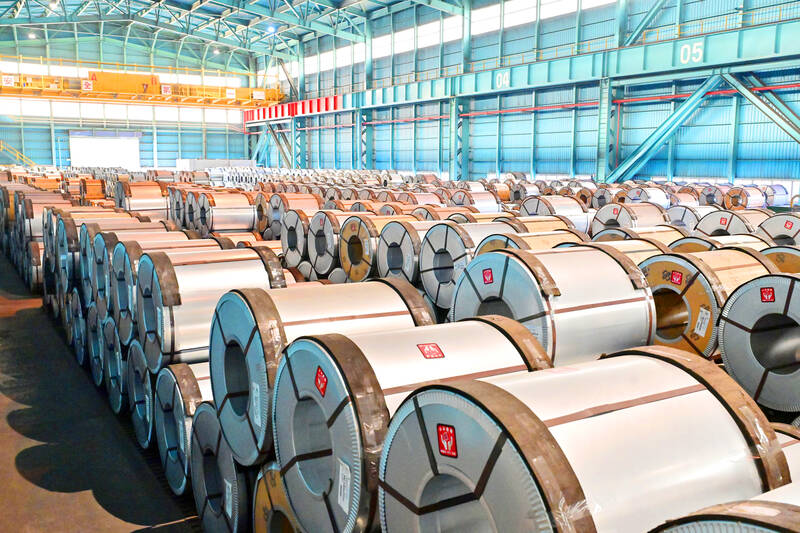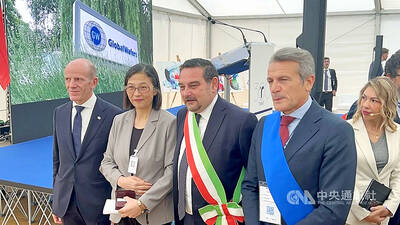China Steel Corp (CSC, 中鋼), the nation’s largest steelmaker, yesterday said it would keep prices intact for some products and make small increases for others next month, as end-market demand needs more time to recover and customers favor low inventory toward the year’s end.
Prices for hot-rolled steel plates, hot-rolled steel coil, cold-rolled steel coil, and steel coil would increase by NT$300 per tonne, the Kaohsiung-based company said.
However, prices would remain unchanged for electro-galvanized steel coils, electrical steel coils and galvanized steel coils used in home appliances and computers, it said.

Photo courtesy of China Steel Corp
CSC said it arrived at the decision after taking into consideration the presidential transition in the US and the introduction of stimulus measures in China.
CSC added it would adopt flexible measures to help upstream and downstream firms improve their business and capacity, in line with market trends and the principle of pricing stability.
The global steel market has observed mixed fortunes, with the global economy gaining momentum, but currency exchange rates and raw material prices have grown increasingly volatile, it said.
The US presidential election has come to a peaceful end, removing uncertainty over its outcome, the company said.
At the same time, China announced a 10 trillion yuan (US$1.3 billion) program to relieve debt pressures on local governments and provide room for fiscal stimulus measures next year, it said.
Overall, the global steel supply remains tight, but it would take some time for the manufacturing industry and end-market demand to emerge from the woods, it said.
US president-elect Donald Trump’s return to the White House might bring new US-China trade disputes that could weigh on Chinese exports, the steelmaker said.
Taiwan has imposed anti-dumping duties on China’s galvanized steel products with the case on hot-rolled steel under way, it said.
Local firms should avoid using China’s low-price steel raw materials in their finished products or semi-finished products to reduce the risk of entanglement in a US-China trade war, CSC said.
Such voluntary practices would lend the Taiwanese government a helping hand in its effort to seek an exemption from US steel tariffs, the company said.
According to the World Steel Association, global steel demand would climb 1.2 percent to 1.77 billion tonnes next year, or an increase of 20.6 million tonnes from this year, as the recovery gains traction.
China’s manufacturing purchasing managers’ index last month returned to expansion after a six-month hiatus, while US private consumption last quarter expanded 3.7 percent, accelerating from a 2.8 percent uptick three months earlier, favorable for Taiwan’s exports, CSC said.
Taiwan might put up a stable GDP growth of 3.15 percent next year, on top of a 4 percent increase this year, CSC added.

RECYCLE: Taiwan would aid manufacturers in refining rare earths from discarded appliances, which would fit the nation’s circular economy goals, minister Kung said Taiwan would work with the US and Japan on a proposed cooperation initiative in response to Beijing’s newly announced rare earth export curbs, Minister of Economic Affairs Kung Ming-hsin (龔明鑫) said yesterday. China last week announced new restrictions requiring companies to obtain export licenses if their products contain more than 0.1 percent of Chinese-origin rare earths by value. US Secretary of the Treasury Scott Bessent on Wednesday responded by saying that Beijing was “unreliable” in its rare earths exports, adding that the US would “neither be commanded, nor controlled” by China, several media outlets reported. Japanese Minister of Finance Katsunobu Kato yesterday also

‘DRAMATIC AND POSITIVE’: AI growth would be better than it previously forecast and would stay robust even if the Chinese market became inaccessible for customers, it said Taiwan Semiconductor Manufacturing Co (TSMC, 台積電) yesterday raised its full-year revenue growth outlook after posting record profit for last quarter, despite growing market concern about an artificial intelligence (AI) bubble. The company said it expects revenue to expand about 35 percent year-on-year, driven mainly by faster-than-expected demand for leading-edge chips for AI applications. The world’s biggest contract chipmaker in July projected that revenue this year would expand about 30 percent in US dollar terms. The company also slightly hiked its capital expenditure for this year to US$40 billion to US$42 billion, compared with US$38 billion to US$42 billion it set previously. “AI demand actually

Jensen Huang (黃仁勳), founder and CEO of US-based artificial intelligence chip designer Nvidia Corp and Taiwan Semiconductor Manufacturing Co (TSMC, 台積電) on Friday celebrated the first Nvidia Blackwell wafer produced on US soil. Huang visited TSMC’s advanced wafer fab in the US state of Arizona and joined the Taiwanese chipmaker’s executives to witness the efforts to “build the infrastructure that powers the world’s AI factories, right here in America,” Nvidia said in a statement. At the event, Huang joined Y.L. Wang (王英郎), vice president of operations at TSMC, in signing their names on the Blackwell wafer to

Taiwan-based GlobalWafers Co., the world’s third largest silicon wafer supplier, on Wednesday opened a 12-inch silicon wafer plant in Novara, northern Italy - the country’s most advanced silicon wafer facility to date. The new plant, coded “Fab300,” was launched by GlobalWafers’ Italian subsidiary MEMC Electronics Materials S.p.A at a ceremony attended by Taiwan’s representative to Italy Vincent Tsai (蔡允中), MEMC President Marco Sciamanna and Novara Mayor Alessandro Canelli. GlobalWafers Chairwoman Doris Hsu (徐秀蘭) said the investment marked a milestone in the company’s expansion in Europe, adding that the Novara plant will be powered entirely by renewable energy - a reflection of its